Mazda MX-30 vs Subaru Forester – Differences & prices compared
Compare performance, boot space, consumption and price in one view.
Find out now: which car is the better choice for you – Mazda MX-30 or Subaru Forester?
The Mazda MX-30 (SUV) comes with a Plugin Hybrid engine and Automatic transmission. In comparison, the Subaru Forester (SUV) features a Petrol MHEV engine with Automatic transmission.
When it comes to boot capacity, the Mazda MX-30 offers 350 L, while the Subaru Forester provides 508 L – depending on how much space you need. If you’re looking for more power, decide whether the 170 HP of the Mazda MX-30 or the 136 HP of the Subaru Forester suits your needs better.
In terms of consumption, the values are 18.30 kWh per 100 km for the Mazda MX-30, and 8.10 L for the Subaru Forester.
Price-wise, the Mazda MX-30 starts at 30800 £, while the Subaru Forester is available from 34700 £. Compare all the details and find out which model fits your lifestyle best!
Mazda MX-30
The Mazda MX-30 is a compact crossover that combines unique design with an environmentally conscious approach. Its distinct exterior features a coupe-like silhouette and freestyle doors that offer practicality and style. Inside, the cabin boasts sustainable materials, creating a harmonious blend of modern aesthetics and eco-friendly innovation.
details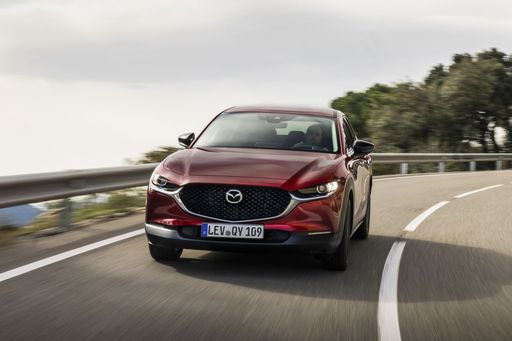 @ de.mazda-press.com
@ de.mazda-press.com
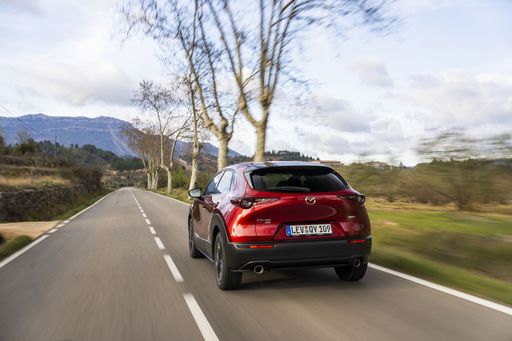 @ de.mazda-press.com
@ de.mazda-press.com
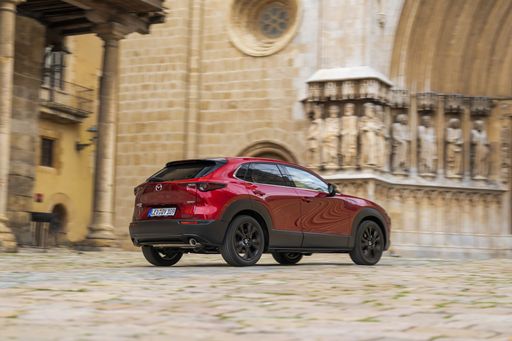 @ de.mazda-press.com
@ de.mazda-press.com
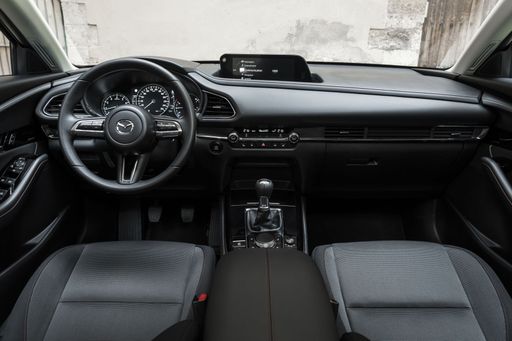 @ de.mazda-press.com
@ de.mazda-press.com
Subaru Forester
The Subaru Forester is a versatile SUV known for its impressive off-road capabilities and practical design. With a spacious interior and advanced safety features, it offers comfort and security for both city driving and outdoor adventures. Its reliable performance and all-wheel-drive system make it a popular choice among those who appreciate a combination of functionality and rugged charm.
details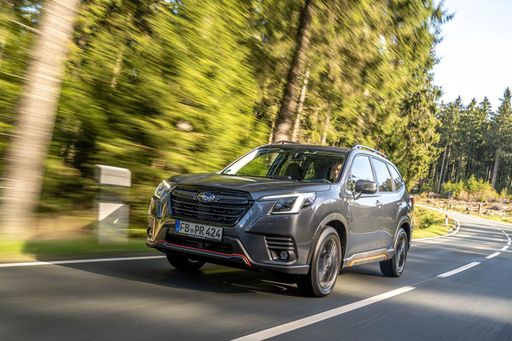 @ Subaru
@ Subaru
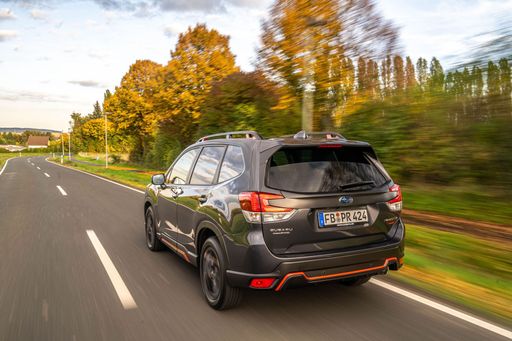 @ Subaru
@ Subaru
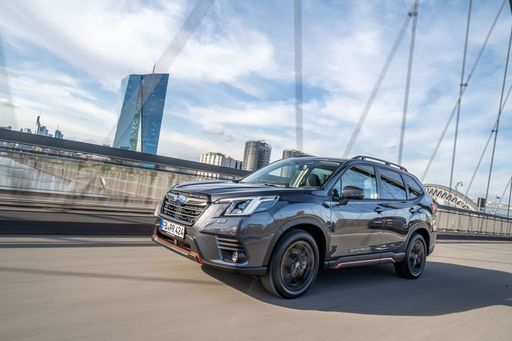 @ Subaru
@ Subaru
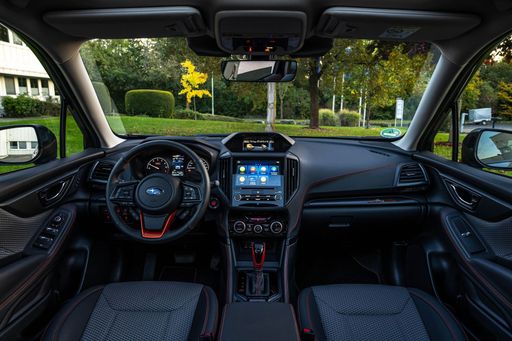 @ Subaru
@ Subaru
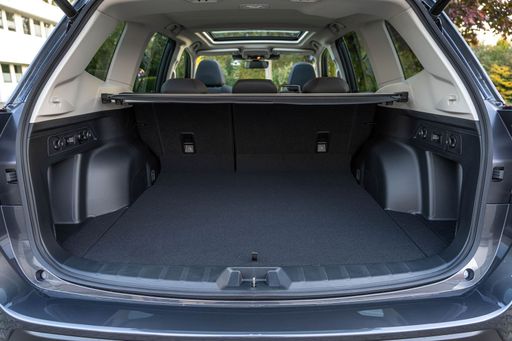 @ Subaru
@ Subaru

|

|
|
|
|
Costs and Consumption |
|
|---|---|
|
Price
30800 - 37100 £
|
Price
34700 - 42200 £
|
|
Consumption L/100km
-
|
Consumption L/100km
8.10 L
|
|
Consumption kWh/100km
18.30 kWh
|
Consumption kWh/100km
-
|
|
Electric Range
85 km
|
Electric Range
-
|
|
Battery Capacity
-
|
Battery Capacity
-
|
|
co2
22 g/km
|
co2
183 g/km
|
|
Fuel tank capacity
-
|
Fuel tank capacity
48 L
|
Dimensions and Body |
|
|---|---|
|
Body Type
SUV
|
Body Type
SUV
|
|
Seats
5
|
Seats
5
|
|
Doors
5
|
Doors
5
|
|
Curb weight
1849 kg
|
Curb weight
1693 - 1739 kg
|
|
Trunk capacity
332 - 350 L
|
Trunk capacity
508 L
|
|
Length
4395 mm
|
Length
4670 mm
|
|
Width
1848 mm
|
Width
1830 mm
|
|
Height
1555 mm
|
Height
1730 mm
|
|
Payload
402 kg
|
Payload
446 - 492 kg
|
Engine and Performance |
|
|---|---|
|
Engine Type
Plugin Hybrid
|
Engine Type
Petrol MHEV
|
|
Transmission
Automatic
|
Transmission
Automatic
|
|
Transmission Detail
Reduction Gearbox
|
Transmission Detail
CVT
|
|
Drive Type
Front-Wheel Drive
|
Drive Type
All-Wheel Drive
|
|
Power HP
170 HP
|
Power HP
136 HP
|
|
Acceleration 0-100km/h
9.10 s
|
Acceleration 0-100km/h
12.20 s
|
|
Max Speed
140 km/h
|
Max Speed
188 km/h
|
|
Torque
-
|
Torque
182 Nm
|
|
Number of Cylinders
-
|
Number of Cylinders
4
|
|
Power kW
125 kW
|
Power kW
100 kW
|
|
Engine capacity
830 cm3
|
Engine capacity
1995 cm3
|
General |
|
|---|---|
|
Model Year
2025
|
Model Year
2025
|
|
CO2 Efficiency Class
B
|
CO2 Efficiency Class
G
|
|
Brand
Mazda
|
Brand
Subaru
|
Mazda MX-30
The Electric Revolution: Mazda MX-30
The Mazda MX-30 represents a bold leap into the realm of sustainable mobility, bringing a distinct blend of style, efficiency, and innovation. As Mazda's first all-electric vehicle, the MX-30 is designed to capture the hearts of eco-conscious drivers while delivering the fun driving experience the brand is known for. Let’s delve into what makes this vehicle stand out in the increasingly crowded electric vehicle market.
Sleek Design Meets Practicality
The MX-30 is a compact SUV that exudes a modern aesthetic with its clean lines and contemporary silhouette. Measuring 4,395 mm in length and 1,848 mm in width, the MX-30 is designed to navigate city streets with ease. Its unique freestyle doors facilitate easy access to the front and rear seats, accommodating up to five passengers comfortably.
Advanced Electric Powertrain
At the heart of the MX-30 is Mazda's e-SKYACTIV drivetrain, available in both fully electric and plug-in hybrid variants. The electric version delivers a respectable 145 PS (107 kW), whereas the plug-in hybrid offers an enhanced 170 PS (125 kW). Both versions employ front-wheel drive with a single-speed reduction gearbox, ensuring a smooth and responsive ride.
Efficiency and Range
The MX-30 showcases commendable efficiency with a power consumption ranging from 17.5 to 17.9 kWh per 100 km. Drivers can expect a maximum electric range of 200 km for the fully electric model, while the plug-in hybrid offers 85 km on electric power alone. This ensures the MX-30 is well-suited for both daily commutes and extended journeys.
Elegant Interiors and Cutting-Edge Technology
Inside, the MX-30 presents a zen-like cabin featuring sustainable materials like cork and recycled fabrics, reinforcing Mazda’s commitment to environmental consciousness. The vehicle comes equipped with a host of technological advancements, including a digital dashboard and a user-friendly infotainment system that keeps drivers connected and informed on the go.
Performance and Handling
Mazda's dedication to driving pleasure continues with the MX-30. With an acceleration time from 0-100 km/h between 9.1 to 9.7 seconds and a top speed of 140 km/h, it promises an engaging drive. The low centre of gravity, courtesy of the battery placement, and its precise steering ensure the MX-30 feels agile and responsive, whether navigating urban environments or open roads.
Safety and Features
Safety is paramount in the MX-30, which boasts an array of advanced features, including collision avoidance systems and a reinforced body structure. It also scores well on CO2-efficiency, rated between Class A and B, making it a responsible choice for eco-minded consumers.
Conclusion: Mazda MX-30 – A Vision of the Future
In conclusion, the Mazda MX-30 is a testament to the brand's innovative spirit and commitment to sustainability. With its combination of striking design, efficient powertrains, and cutting-edge technology, the MX-30 is a formidable competitor in the electric vehicle market. Offering a blend of sophistication and performance, it is poised to win over motorists who seek an environmentally friendly vehicle without compromising on driving joy.
Subaru Forester
The Subaru Forester: A Staple of Innovation
The Subaru Forester continues to stand out as a robust and reliable choice in the SUV market. Known for its rugged capabilities and thoughtful design, the Forester combines traditional Subaru strengths with modern technological innovations. As an all-wheel-drive vehicle, it promises safety, efficiency, and performance in a dynamic package.
Engineering and Performance
At the heart of the Subaru Forester lies its 2.0-litre petrol mild-hybrid engine, delivering a stout 150 PS and 194 Nm of torque. This power is channelled through an advanced CVT gearbox, ensuring smooth and responsive acceleration. The vehicle can sprint from 0 to 100 km/h in approximately 11.8 seconds, showing its agility despite its SUV stature.
One of the highlights is its all-wheel-drive system, designed to offer excellent traction and stability across diverse driving conditions. The Forester provides a top speed of 188 km/h, ensuring an exciting drive whether you're navigating city streets or venturing onto the open road.
Technical Specifications
The Forester maintains a balance between practicality and efficiency. With a fuel consumption rate of 8.1 L/100km and CO2 emissions positioned at 185 g/km, this SUV provides an efficient yet powerful performance. The mild-hybrid system is supported by a 0.6 kWh battery, offering enhanced fuel economy and reducing environmental impact.
Weighing between 1658 and 1693 kg, the Forester is designed to offer both robustness and fuel efficiency. It boasts a generous cargo capacity of 509 litres, perfect for both daily use and adventurous getaways. The exterior dimensions—4640 mm in length, 1815 mm in width, and 1730 mm in height—strike a balance between presence and manoeuvrability.
Design and Interior Features
With a sleek and modern design, the Forester is available in several trims catering to different customer preferences, such as the Trend Lineartronic, Active Lineartronic, and the luxurious Edition Exclusive Cross Lineartronic. The interior space is noteworthy, providing comfortable seating for five passengers, making it an excellent option for family journeys.
Safety and convenience are paramount in the Forester, featuring driver assistance systems designed to support and protect. The model comes equipped with state-of-the-art technology to keep occupants entertained and connected, enhancing the driving experience significantly.
Affordability and Running Costs
Price-wise, the Subaru Forester ranges from €37,790 to €46,450, aligning with its features and capabilities. The monthly costs for ownership may vary between €1125 and €1221, with costs per kilometre ranging from 45 to 48.9 cents. For those seeking an SUV that's a combination of comfort, reliability, and reasonable running costs, the Forester presents a persuasive choice.
Conclusion
The Subaru Forester remains a solid contender in the SUV segment, offering a mix of performance, practicality, and modern features. This vehicle is engineered for those who desire a dependable and versatile companion for all their adventures. With its blend of innovative technologies and classic Subaru reliability, the Forester continues to be an attractive option for discerning drivers.
Which drive types are available for the Mazda MX-30?
Available as Front-Wheel Drive.
The prices and data displayed are estimates based on German list prices and may vary by country. This information is not legally binding.
